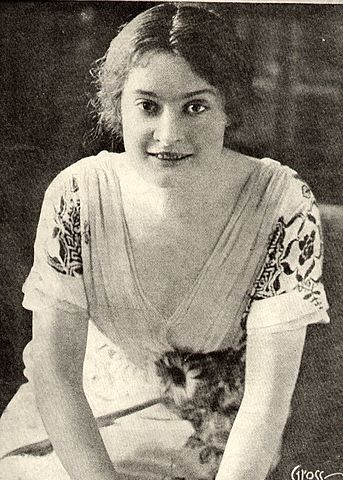Nora Bayes, the Beyoncé of the early 20th Century

Nora Bayes in 1912, Public Domain
What do Nora Bayes and Beyoncé have in common? Vanity Fair included them both in this video celebrating the fashions of “top pop stars” of the past 100+ years.
No doubt you’ve heard of this Beyoncé. But what do you know about Nora Bayes, star of Broadway and vaudeville?
She made a cameo appearance in one of my recent blogs. Nora Bayes, née Eleanora Sarah Goldberg, introduced the world to “Take Me Out to the Ballgame.” She followed that with several other hit records. George M. Cohan personally chose her to record his morale-boosting song “Over There” during World War I. It became an international hit. Shortly after the war ended in 1918, she became the first woman to have a Broadway theatre named after her, the Nora Bayes Theatre, of course.
Bayes’s second husband, Jack Norworth, wrote some hit songs for her, like “Shine On, Harvest Moon”—probably their biggest hit. But Bayes also wrote songs in her own right—music and lyrics. In fact, most sources neglect to mention that she co-wrote “Shine On, Harvest Moon” with Norworth.
More than half a dozen Broadway shows—including Ziegfeld Follies of 1931—featured “songs by Nora Bayes,” according to her listing in the Internet Broadway Database. Several others bear the credit “additional lyrics by Nora Bayes.”
She died in 1928—but her memory apparently lived on, because in 1980 writer Garson Kanin used her as the central character of his novel Smash. If that title seems familiar, yes, the book served as at least part of the basis of the television series Smash. But the producers swapped out Nora Bayes for a more contemporary figure, Marilyn Monroe.
Who was Nora Bayes?
I could end this post right now and you’d have an interesting bunch of trivia about a star of the early 20th century. But Nora Bayes was more than “…one of those rare female triple-threats in vaudeville entertainment” and “easily the most popular female entertainer in vaudeville for much of the first quarter of the 20th century.” She was also a fiercely independent woman, unafraid to forge her own path. Perhaps the comparison with Beyoncé runs deeper than their fashion style.
The Jewish Women’s Archive profile of Bayes tells us:
“In…battles with male businessmen and in her unconventional personal life, Bayes provides some flamboyant, indeed extreme, examples of the broad social changes happening in the United States in the early twentieth century, namely the questioning of traditional roles for women as well as the challenges to male political and economic power that marked the women’s movement of the time.”
Florenz Ziegfeld banned her from show business after she walked out on his 1909 Follies. But she had the last laugh—audiences missed her. She returned to the stage triumphantly, with an even more lucrative contract than she’d had before: $2,500 a week—more than $60,000 in today’s dollars.
Several years later, she broke her contract with a vaudeville producer and set out on her own:
“…she launched her own two-hour, one-woman show in 1917, starred in the musical Ladies First in 1918, and then continued to perform in vaudeville in the England and the United States through 1927.”
Who knows what Bayes would have done if her cancer hadn’t been misdiagnosed early on? But she died in 1928, leaving behind three young children adopted with her fifth husband.
Story Safari™
I love finding stories like these. How many other strong women have been all but lost to history? I’ll look for an opportunity to bring Nora Bayes back to life in one of my clients’ speeches.
2 comments on “Nora Bayes, the Beyoncé of the early 20th Century”
Comments are closed.
For the latest research on her life: https://norabayes.wordpress.com/
Her story would make a very good bio-pic. Thank you for this!